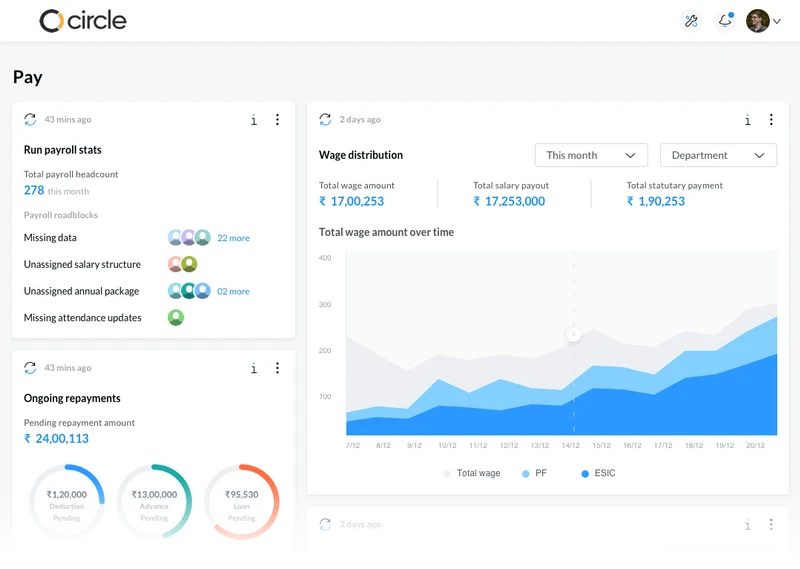The pandemic is stressful for every one of us. We live in constant fear of catching the contagious infection and transmitting it to our family members, which can make daily functioning quite difficult.
Arguably, working professionals experience greater levels of stress than others. Nearly 7 in 10 employees indicated in a survey by mental health provider Ginger that the pandemic is the most stressful time of their entire professional career. This is because employees need to handle work stress along with the pandemic related stress.
High-stress levels have a bad effect on their overall well-being. They become susceptible to stress-induced physical health problems such as headache, high blood pressure and digestive disorders. 1
Stress also leads to a chaotic mental state which disrupts their ability to concentrate properly on work. As a result, they become less productive, exhibit higher absenteeism and don’t perform well.
This way, high job stress is neither good for the employees, nor the organisation. Thus, employee stress management has become one of the most significant responsibilities for HRs like you, during the pandemic. Let us look at why we need to have stress
What is the Importance of an Employee Stress Management Program?
The current pandemic has taken a toll on job security, emotional health and physical health. If you observe carefully, you can easily notice the symptoms of stress having negative effects on your employees. Excessive stress combined with excessive workload can also hamper their job performance. Other than physical ailments such as heart disease and weight gain, stress can impact the decision making and time management qualities of employees. So, stressed-out employees are a hazard to themselves and to the organisation.
Hence, it is the responsibility of an organisation to provide a conducive environment for every worker. Stress management and wellness programs can have a positive impact on employees. So, managers need to make workplace wellness a high priority so that they can have healthier employees who are happy and secure. This is achieved through a program that includes the following practices.
What Managers Can Do To Ease Workplace Stress
Although you are also experiencing the effects of stress, you have to stabilise yourself and start taking steps to help your workers with stress management. Consider yourself as the gardener who takes care of his plants, who are the employees. Careful nourishment is key for these plants to bloom.
Here are some effective stress management practices through which you can help your employees manage their stress levels.

1. Hold daily group meditation sessions:
Meditation is one of the most effective techniques to manage workplace stress. According to WebMD, if practised for as few as 10 minutes each day, meditation can help you manage stress, reduce anxiety, improve cardiovascular health and achieve a greater capacity for relaxation.
Here’s why you need to do this
- Firstly, deep breathing is a vital part of meditation. This increases the supply of oxygen to your brain and makes you feel calmer. As a result, you enter into a deep state of relaxation and your stress level gets reduced.
- Secondly, while meditating, you become conscious of your thoughts. You don’t interfere with them but just watch them as if you are watching a TV show. This gradually takes you into a thoughtless state. When there are no thoughts, there is no stress too! Thus, you experience a great sense of relief from anxiety.
- Thirdly, regular meditation gradually builds your resilience against stress. As a result, you no longer get overwhelmed by stress. Your body doesn’t respond to stress in the same anxious way as it used to. Instead, it becomes capable of handling stress without developing its induced physical troubles such as muscle tensions and headaches.
So, meditation can work wonders on stress if you make it an everyday must for your employees. If your employees are currently working from home, you can conduct a 20 minute morning meditation session every day via video conferencing.
If your employees come to work in the office, you can make them sit together by the social distancing measures for meditation.
2. Organise fun activities to help your employees develop a relaxed mental state:
Having fun is an excellent way of stress management. It triggers laughter and enjoyment which make you forget about stressful thoughts for some time. These fun activities can pass for regular breaks that are more enjoyable and enriching.
Given below are some ideas for fun activity hours that you can arrange for your employees. If your employees are working from home, you can conduct these fun activities via video conferencing.
- Listen to stand up comedies together: Stand up comedies are fun. Moreover, when your employees sit together to listen to them, they become even more enjoyable.
- Playing games: Playing is always fun. It helps in bringing out your inner child. So, you should try and play games with your employees.
There are many indoor office games which you can play with them such as bingo, musical chairs and charades. You can also find many more such games on the internet.
- Plan a movie day once in a week: Almost everyone enjoys watching movies. So, you can plan a movie day once every week and watch some light-hearted or funny movies with your employees.
3. Let your employees work from home OR make sure to take recommended safety precautions in your organisation if your workforce isn’t remote:
Being outdoors is a massive stressor for everyone right now. Whenever we travel, our fight or flight response gets triggered as we are always fearful of falling sick and falling prey to the coronavirus.
Under such circumstances, you can keep employee health in check by letting them work from the safety of their homes. If not, you should aid in building a safe working environment for your workers. This will help your employees feel safe and lower their stress levels.
Given below is a list of some must safety precautions which you should take in your organisation:
- Conduct temperature checks for everyone before they make an entry into the office premises: Although many infected patients do not show symptoms initially, some do. So, conduct temperature checks for everyone before they enter into the office premises.
- Plan socially distanced seating arrangements: Social distancing is one of the most important safety precautions against Covid-19. So, you should plan the sitting arrangement by the norms of social distancing. This implies that everyone should sit at least one meter away from each other.
- Regularly sanitise frequently touched surfaces, including washrooms: The novel coronavirus can thrive on every surface. This makes it crucial for you to ensure regular sanitisation of frequently touched surfaces, including washrooms.
- Promote regular and thorough hand washing or sanitising by your employees: As you already know, regular hand washing or sanitising is vital to stay protected against Covid-19. You can place sanitising hand rub dispensers at prominent places in your organisation. This will remind your employees to sanitise their hands regularly.
- Don’t allow anyone to enter inside the office premises without a mask:
Wearing a mask reduces the airborne droplet transmission of Covid-19 significantly. Thus, you should make it compulsory for everyone to wear a mask.
4. Introduce physical activities like exercise and dancing as integral parts of the work schedule:
According to the Anxiety and Depression Association of America, physical activity helps with stress management. This is because it triggers the release of endorphins in your brain. Endorphins are natural painkillers, elevate your mood and also improve your ability to sleep. As a result, your stress level gets significantly reduced.
So, to help your employees with stress management, you should introduce physical activities like exercise and dancing as integral parts of the work schedule of your organisation.
You can gather your employees whenever convenient for a 20-minute exercise or dancing session. However, you should ensure that proper social distancing is maintained even during the physical activity sessions. If your employees are currently working from home, you can conduct the physical activity sessions via video conferencing.
To help your employees exercise well, you can utilise various workout videos available on YouTube. But, if you choose dancing, you can just play some party songs and let your employees dance freely.
5. Extend regular appreciation and recognition to your employees:
How do you feel when someone appreciates you for something? Happy or grateful or satisfied right? Just a few words of appreciation from someone are sufficient to ignite immense feelings of happiness within you. And, when you feel happy, your stress level naturally gets reduced.
This is a straightforward way to reduce your employees’ stress levels, i.e. extending regular appreciation and recognition to them. 75% of employees who were appreciated by their manager reported being happy and satisfied. 2. So, appreciate them for the small things that matter, such as punctuality and focus. This also contributes to employee engagement
6. Lend them a sympathetic ear to listen:
According to Eva Stubits, a clinical psychologist from Houston who specialises in stress management, talking about how stressed you are can help you get it out of your system. It can help you release bottled up emotions, feelings and worries, which then induces deep feelings of relaxation and brings a reduction in your stress level.
This implies that you can help your employees with stress management by simply lending a sympathetic ear to listen. You can let them know that you are always there for them. They might be going through work-related stress or any other stressful situation that they need to talk about.
If you think that your employees may feel uncomfortable sharing their feelings with you, you can start by sharing your feelings with them. Then, they’ll naturally feel inclined to share their worries with you too. This way, you’ll help them vent their worries out and experience significant relief from stress.
7. Be empathetic towards your employees:
The uncertainty of the pandemic might reflect in a decline in work performance. If you observe this trend, do not be harsh with your employees. Instead, be empathetic towards them and try to know if they are facing any issues.
Do not try to directly bring up their declined work performance. Simply enquire about their well-being without discussing work-related topics. This will engage them to open up with you, and then, you can offer the desired help to them.
8. Eradicate micromanagement and let your employees work autonomously:
Micromanagement can be a source of stress for several employees. 38 % of employees who face this end up quitting. 3 Try to eradicate micromanagement from your organisation, especially right now, when your employees are already so stressed out. Guide your teams and their heads to quit micromanagement ASAP!
In Conclusion
It is very challenging for professionals to juggle work-stress and the pandemic-stress. They are like ticking time bombs for stress-induced physical and mental health problems. This is neither good for them nor your organisation.
So, stress management strategies can have a positive impact on a stressed worker. The above-mentioned strategies are easy to implement and effective. You should also follow these stress management practices along with your employees to keep your stress levels managed too. Now, wishing you all the best and may you and your employees be blessed with immense relief from stress.
And if you’re looking to automate your HR process try out sumHR, an all in one HR Software for SME’s around the Global, whether you’re in the United States, the United Kingdom, UAE or India, we got you covered.
Book Your Free Demo Now.








